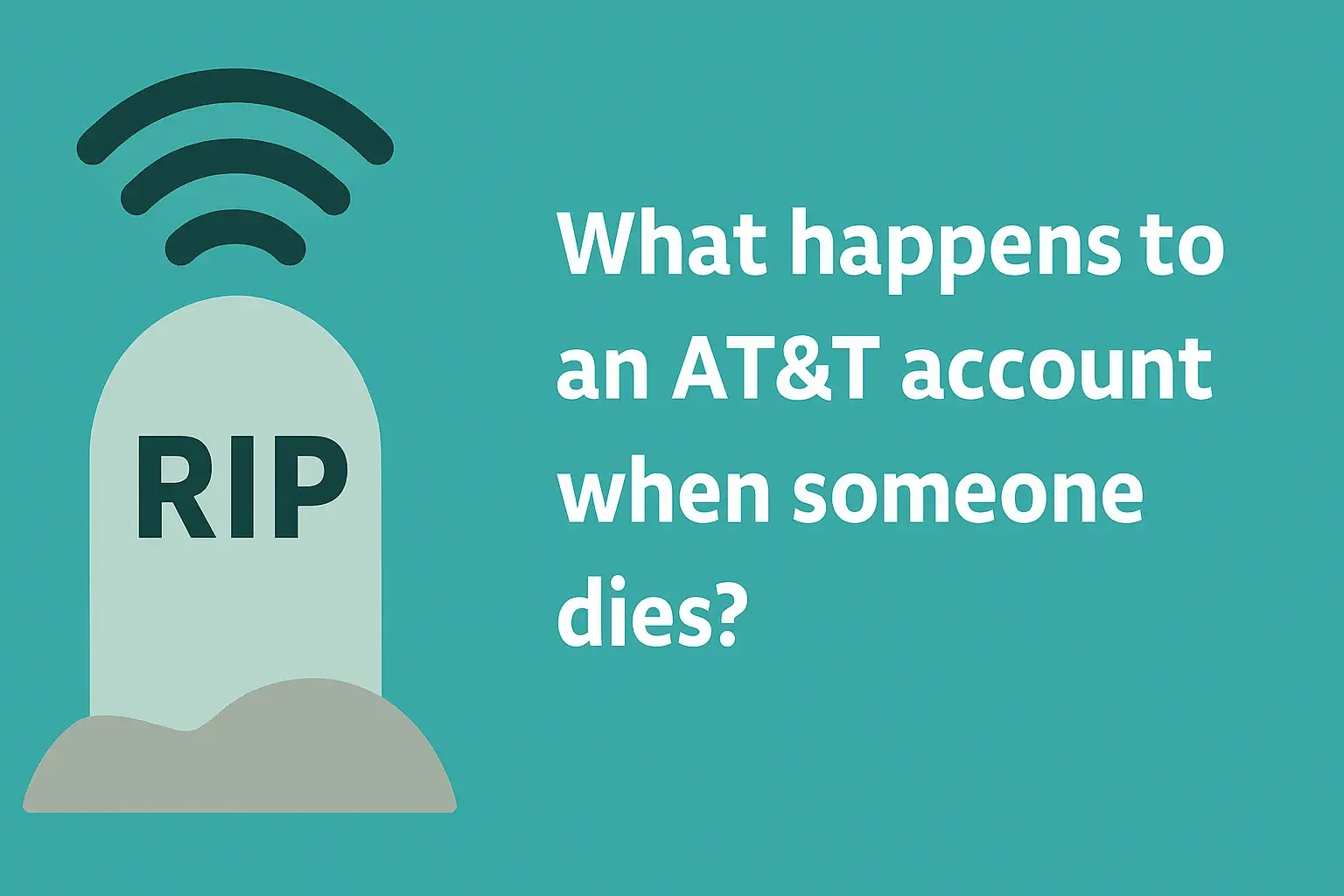What happens to an AT&T account when someone dies?

Losing a loved one is an emotionally overwhelming experience, and amidst the grief, practical tasks like managing their digital footprint and financial accounts can feel daunting. In our connected world, handling a deceased family member's mobile phone, internet, and television services is a necessary part of settling their estate. It’s a step that, when handled correctly, can prevent ongoing bills, protect personal data, and provide a sense of closure.
As one of the nation's leading telecommunications providers, AT&T Internet has established specific procedures for managing an account after a customer passes away. Understanding these protocols in advance can save you time and stress during a difficult period. This comprehensive guide will walk you through exactly what happens to an AT&T account when someone dies, detailing the steps you need to take, the documents you'll need to gather, and the options available to you for either closing or transferring the account. Our goal is to provide you with clear, authoritative information to navigate this process with confidence and compassion.
Understanding AT&T Account Policies After Death
Before taking any action, it's crucial to understand the legal and contractual framework that governs an AT&T account. An AT&T account is a legal contract between the company and the primary account owner. This individual is solely responsible for the charges and has full authority to make changes.
When the account owner passes away, this contract is not automatically transferred or voided. AT&T’s policy is designed to protect the privacy and security of their customer, even after death. This means that simply knowing the password or being an authorized user on the account is not enough to manage or close it legally. An authorized user can make certain changes, like upgrading a device, but does not have the legal authority to cancel the account or assume ownership after a death.
The legal right to handle the account transfers to the executor of the estate (if there is a will) or the court-appointed administrator (if there is no will). If you are the next of kin but not the formally designated executor, you may still be able to handle the account, but you will need to provide documentation proving your relationship and authority. AT&T requires this verification to ensure they are dealing with the correct legal representative.
What Happens to the Account Immediately After Death
In the immediate aftermath of a loved one's passing, it's understandable that notifying service providers may not be your first priority. However, it's important to know the status of the account during this time.
-
Services Remain Active: Unless AT&T is formally notified, all services—wireless lines, internet, and TV—will continue to function. This means phone lines will still ring, data will still be available, and billing cycles will continue.
-
Billing Continues: Monthly charges will continue to accrue. If the account was set up for automatic payments from the deceased's bank account or credit card, those payments may continue to process, potentially draining estate assets.
-
No Automatic Cancellation: AT&T does not automatically cancel an account upon learning of a death through external means (e.g., obituaries). The responsibility falls on the family or estate representative to initiate contact.
Therefore, acting promptly is key to avoiding unnecessary charges. While you should allow yourself time to grieve, notifying AT&T as soon as you are practically able is a critical financial step.
How to Notify AT&T of a Customer’s Death (Step-by-Step Guide)
The process for notifying AT&T of a customer's death is structured to ensure security and efficiency. Following these steps will help streamline the process.
Step 1: Gather Required Documentation
Having the correct documents ready before you call will save you significant time. AT&T will require the following:
-
Death Certificate: You will need to provide an original or a certified copy of the death certificate. This is the primary document that verifies the passing.
-
Proof of Your Identity: A valid government-issued photo ID, such as a driver's license or passport, is required to verify that you are who you claim to be.
-
Proof of Your Authority: This proves you have the legal right to manage the account. This can be:
-
Letters Testamentary or similar court documents naming you as the executor of the estate.
-
A small estate affidavit (if applicable in your state).
-
If you are the surviving spouse or next of kin and no formal estate proceedings have been initiated, you may still proceed, but be prepared to explain your relationship.
-
-
Account Details: Try to locate the account number, the phone number(s) on the account, and the account holder's billing address.
Step 2: Contact AT&T Customer Support
Once your documents are in order, you need to reach out to the dedicated department that handles these sensitive situations.
-
Primary Method: Call the AT&T Office of the President or dedicated bereavement support line. A simple web search for "AT&T deceased account" will provide the most current direct number. This is often the most efficient path.
-
Alternative Methods: You can also visit a corporate-owned AT&T store in person or initiate a chat through the AT&T website. However, phone contact is generally recommended for this specific issue.
-
What to Expect: When you connect, clearly state that you are calling to report the death of an account holder. The representative will guide you and explain exactly how to submit the documents you gathered in Step 1.
Step 3: Submit Documentation
AT&T will provide instructions on how to securely submit your documentation.
-
Methods: This is typically done via a secure online portal link emailed to you, by fax, or by mailing copies to a specific address. In-person submission at a store is also sometimes an option.
-
Processing Timeline: Once submitted, it can take several business days for AT&T internet service to verify the documents. The representative will give you an estimated timeline for processing your request.
Step 4: Decide on Account Closure or Transfer
After verification, AT&T will work with you to execute your decision. You have two primary options:
-
Option 1: Cancel the Account. This terminates all services and stops future billing.
-
Option 2: Transfer the Account. This allows you to transfer the account ownership to another eligible person (like a surviving spouse or adult child).
Options for Handling the Account After Death
Once you've notified AT&T, you'll need to decide the best path forward for the account. Here’s a detailed look at your choices.
Canceling the Account
This is the most straightforward option if the services are no longer needed.
-
Process: AT&T will terminate all lines and services on the account as of a specific date, which is often the date you notified them or the date of death (backdating may be possible).
-
Final Bill: You will receive a final bill. This bill will include charges for services used up until the cancellation date, plus any outstanding device installment plans or past-due balances.
-
Early Termination Fees (ETFs): Importantly, AT&T typically waives early termination fees when an account is closed due to the death of the account holder. However, any remaining device balance is still owed by the estate.
-
Device Payments: If there are devices still being paid off through an AT&T Next installment plan, the remaining balance becomes due on the final bill. The devices themselves belong to the estate once the balance is paid.
Transferring Ownership
If you wish to keep the phone numbers and continue service, you can request an AT&T account death transfer.
-
Eligibility: The person assuming the account must typically be a spouse or immediate family member and must pass a standard credit check.
-
Process: AT&T will guide you through the process of creating a new account in the new owner's name and transferring the services. This is essentially a "change of responsibility."
-
Plan and Number: The existing plan, phone numbers, and billing cycle can usually be transferred over to the new account, providing continuity.
-
Device Contracts: Any device installment plans will also transfer to the new account owner, who will then be responsible for the remaining payments.
Keeping the Account Active for Estate Purposes
In rare cases, you may need to keep the account active for a short time to manage the deceased's affairs—for example, to receive calls related to their business or to access two-factor authentication codes for other accounts. You can discuss a temporary extension with the AT&T representative, but be aware that billing will continue during this period.
Billing, Outstanding Balances, and Final Payments
A primary concern for families is financial responsibility. Here’s what you need to know about settling an AT&T bill after death.
-
The Estate's Responsibility: The outstanding balance on the account, including the final bill, becomes a liability of the deceased's estate. It is not automatically transferred to a family member unless they assume the account.
-
Final Bill: The final bill will be generated after the account is closed or transferred. It will detail all prorated charges and any remaining balances.
-
Automatic Payments: Once you notify AT&T and the account is processed, any future automatic payments will be stopped. It is also wise to contact the bank to stop recurring payments from the deceased's account as an extra precaution.
-
Settling Debts: The executor of the estate is responsible for using estate funds to pay the final AT&T bill. If the estate lacks sufficient funds, the debt may go unpaid, but relatives are not personally liable unless they were co-signers on the account.
What Happens to Phone Numbers, Devices, and Data
Beyond the account itself, the associated assets like phone numbers and data require careful consideration.
-
Phone Numbers: If you cancel the account, the phone numbers will eventually be recycled and reassigned to new customers. If you wish to keep the same phone number, you must transfer the account to a new owner or port the number to a different provider before canceling the account.
-
Devices: Any devices that are fully paid off belong to the estate. Devices under a payment plan will need to be paid off to be owned outright. The new account owner can continue making payments if the account is transferred.
-
Data, Voicemail, and Call Logs: This is a sensitive area governed by privacy laws. Accessing a deceased person’s AT&T account data (like text messages, photos, or voicemails) is generally not permitted by AT&T without a court order. The company is bound by privacy regulations (CPNI) that protect customer data even after death. If accessing data is critical for legal or estate reasons, you will likely need to consult with an attorney to obtain a court order directing AT&T to provide access.
Special Considerations: Business Accounts, Family Plans, and Joint Accounts
The process can differ slightly depending on the type of account.
-
Family Plans: If the deceased was the primary account holder on a family plan, the entire account is affected. The process for notification and transfer is the same, but it impacts all lines on the plan. A surviving user on the plan is often the best candidate to assume ownership.
-
Business Accounts: Business account procedures can be more complex. AT&T will likely require documentation from the business, such as a letter from a company officer or a copy of the business registration, in addition to the death certificate, to determine who has the authority to manage the account.
-
Joint Accounts: True joint accounts where two people are listed as equal account owners are less common. In such a case, the surviving account owner would typically assume full control of the account without the need for a formal transfer process. However, you should still notify AT&T to update the account records.
Legal & Privacy Concerns
AT&T's requirement for documentation is not bureaucratic red tape; it's a necessary measure to protect their customer.
-
Privacy Laws: Laws governing Customer Proprietary Network Information (CPNI) strictly limit the disclosure of account details without customer consent or legal authority. After death, the legal authority transfers to the executor.
-
Court Orders: In situations where there is a dispute over the estate or if the executor needs access to the content of the account (e.g., emails, texts), a court order may be the only way to compel AT&T to provide that information. This underscores the importance of including digital assets in your estate planning.
Tips to Make the Process Smoother
Based on experience, here are key takeaways to simplify managing an AT&T account after a death:
-
Notify Promptly: Contact AT&T as soon as you are able to avoid accumulating charges.
-
Gather Documents First: Have the death certificate and your ID ready before you call.
-
Be Clear and Direct: When calling, immediately state the purpose of your call to be directed to the correct department.
-
Keep Detailed Records: Note the date you called, the name of the representative you spoke with, and any case or reference numbers. Keep copies of all submitted documents.
-
Ask About Fee Waivers: Confirm that any early termination fees will be waived due to the death.
-
Plan Ahead: As part of your own estate planning, consider creating a list of your digital accounts and passwords (stored securely) and designate a digital executor to make this process easier for your loved ones.
Conclusion
Navigating the practicalities after a loss is never easy, but understanding what happens to an AT&T account when someone dies can alleviate one source of stress during a challenging time. By gathering the necessary documents and contacting AT&T's dedicated support team, you can efficiently manage the account—whether that means closing it to wrap up affairs or transferring it to maintain important connections.
Remember, you are not alone in this process. AT&T has procedures in place to handle these situations with respect and efficiency. The key steps are to act promptly, be prepared with documentation, and communicate your wishes clearly. If you encounter complex legal questions, especially regarding access to data or disputes within the estate, do not hesitate to seek guidance from a qualified legal professional. Handling these details is a final, caring act for your loved one, allowing you to focus on healing and remembrance.
Faq
Q1: What happens to an AT&T account when someone dies?
The account remains active until AT&T is formally notified by the legal next of kin or executor of the estate. Billing continues, and the estate is responsible for any charges accrued until the account is either canceled or transferred to a new owner.
Q2: How do I close a deceased person’s AT&T account?
You need to contact AT&T’s dedicated bereavement support, provide a certified death certificate and your ID, and request account cancellation. They will guide you through the submission process and generate a final bill for the estate.
Q3: Can I transfer an AT&T phone plan to myself after the account owner dies?
Yes, through a process called an "account transfer of responsibility." As a surviving spouse or family member, you can undergo a credit check to transfer the account and its services into your name.
Q4: What documents does AT&T require after someone passes away?
AT&T requires a certified copy of the death certificate, a government-issued photo ID of the person handling the account, and documentation proving your authority to act (e.g., Letters Testamentary).
Q5: Will I be charged an early termination fee if I cancel an AT&T account due to death?
Typically, no. AT&T generally waives early termination fees in these circumstances. However, any outstanding device installment plan balances must be paid by the estate.
Q6: How can I access my loved one’s phone data or voicemail?
This is often difficult due to privacy laws. AT&T will not typically grant access to account content without a court order. If access is essential, you should consult with an attorney.
Q7: Can I keep the same phone number if I take over the account?
Yes, one of the primary benefits of transferring the account instead of canceling it is that you can retain the existing phone numbers.
Q8: How long does it take for AT&T to process a deceased customer’s account?
After you submit the required documentation, it usually takes a few business days for verification. The entire process, from notification to final resolution, can take one to two weeks.
Q9: What happens to outstanding device payments after death?
The remaining balance on any device payment plan becomes a debt of the estate and is included on the final bill. If the account is transferred, the new owner assumes responsibility for the remaining payments.
Q10: What if I don’t notify AT&T about a customer’s death?
Services will continue, and billing will accrue indefinitely. Automatic payments may deplete the deceased's bank account. It is crucial to notify them to stop these charges.





